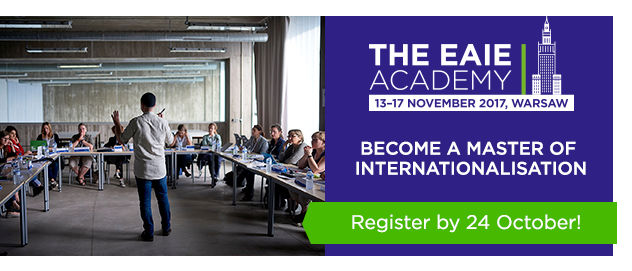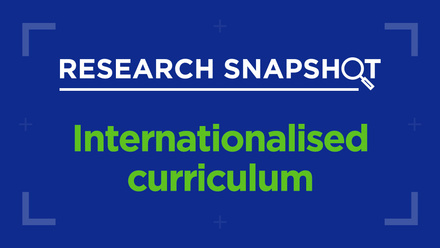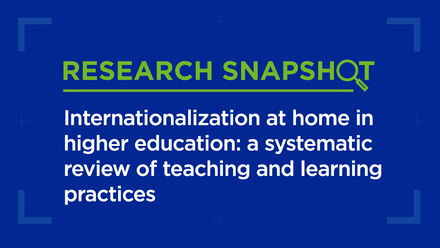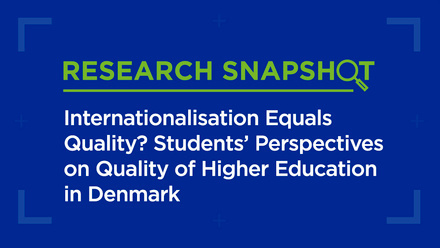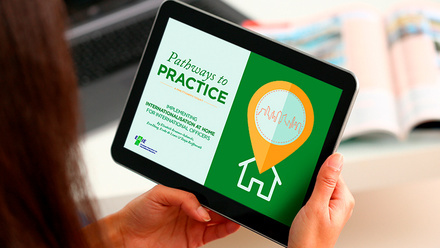International officers finding their role in internationalisation at home

Though internationalisation at home is a relatively recent concept, it has already been embraced widely, particularly in northern and western Europe. Internationalisation at home aims to bring internationalisation to all students through the home curriculum. It is therefore primarily about teaching and learning, which implies that lecturers are increasingly becoming prominent players in internationalisation. After all, they are the ones who create learning environments with international and intercultural dimensions. In today’s blog, internationalisation at home expert Jos Beelen looks at where the international officer fits in.
The increased prominence of lecturers has implications for other stakeholders in the internationalisation process. At many continental European universities, international officers have been involved in many aspects of internationalisation. These range from the management of mobility to the development of internationalisation policies, the management of international projects and everything else with the word ‘international’ in it. International officers often remark that ‘every envelope with a foreign stamp on it’ ends up on their desk.
This explains why internationalisation at home has also landed on the plate of the international officer. Many international officers feel responsible for its implementation, or others consider them responsible, even if this responsibility has never been formally assigned to them. The question is if the international office is the most logical place for internationalisation at home. Can the international office be responsible for teaching and learning? If not, what is the role of the international officer in internationalisation at home?
Worldwide obstacles to internationalisation
That international officers continue to take the lead in internationalisation is also influenced by another factor. Universities have observed that lecturers lack skills for internationalisation. In fact, this lack of skills has even been acknowledged as the second biggest worldwide obstacle to internationalisation (the first being, as always, lack of financial resources). Although universities are aware that lecturers need training, they offer but few professional development options for internationalisation of teaching and learning.
Where does this leave international officers? On the one hand, they feel responsible for backing up internationalisation policies, but they have to work with lecturers that have not been prepared for the international aspects of their tasks. And what is the role of faculties and departments in internationalisation of the home curricula?
Arguments for internationalisation at home
Faced with this situation, they follow a range of strategies to make progress with the implementation of internationalisation at home. First, they tirelessly explain to managers, academics and anyone who wants to listen what internationalisation at home means and fight misconceptions. Here are some of the arguments they use:
- Internationalisation is relevant for all programmes, not only for those taught in English
- It is not a matter of ‘one size fits all’: every discipline has its own internationalisation
- Internationalisation is not something that comes on top of the existing curriculum but rather is embedded within it
- International and intercultural dimensions cannot be separated
- All graduates will deal with international and intercultural dimensions in their future professional practice
- Internationalisation needs to be in the compulsory curriculum, not in electives for a minority of students
Second, international officers try to identify academics that are interested in the topic and stimulate and support them as best they can. However, regardless of how hard they try, the efforts of international officers do not always have the desired effect. They only reach a small minority of lecturers, often those who were already convinced of the importance of internationalisation.
A third strategy of international officers is convincing academics to teach abroad. Mobility of academics has been considered a tool to develop the skills for teaching international and intercultural themes. However, it is not always clear what lecturers learn from teaching abroad and again, only a small percentage of lecturers is mobile; often again those that were already believers in the benefits of internationalisation.
Internationalising teaching and learning
The efforts of international officers often do not have ‘systemic’ effects in the sense that they tap into the existing systems for teaching and learning. Every institution has specialists in teaching and learning, that go by a variety of names, such as educational developers, academic developers or teaching and learning centres. These educational specialists have often not been included in the internationalisation debate, which is manifesting itself now that the internationalisation of learning outcomes is moving up in the agendas of universities.
How can international officers be effective in internationalising teaching and learning? Their effectiveness depends on how well they are able to analyse their own roles and those of others in the complex processes of a university. The situation can indeed be complicated. Some stakeholders, such as deans or heads of departments, may have a formal responsibility but may not be familiar with the concept of internationalisation at home. Others may not be formally responsible, but still have an influential role.
This is why role analysis is a central element in the training course ‘Internationalisation at home; effecting change at your university’.
Such an analysis is required for an action plan that involves the stakeholders that have the required expertise and power to make the systemic changes that affect the university as a whole and move beyond a small group of lecturers. The international officer will share responsibility with professional developers, educational specialists, curriculum committees, managers and others and will contribute in fields where he or she has most expertise. In such a configuration, the international officer will continue to be a key player. He or she will also be able to sleep at night, knowing that internationalisation for all students has mainstreamed itself into the systems of the university.
Want to learn more?
Internationalisation at home: affecting change at your university is one of several training courses offered at the EAIE Autumn Academy taking place in Warsaw, Poland. Along with Marijke van der Heijden, author Jos Beelen will be teaching participants how to design an effective strategy for internationalising curricula. Be sure to register by 27 September to save on the fee.
Jos Beelen is Senior Policy Adviser for Internationalisation at the Amsterdam University of Applied Sciences in the Netherlands.
